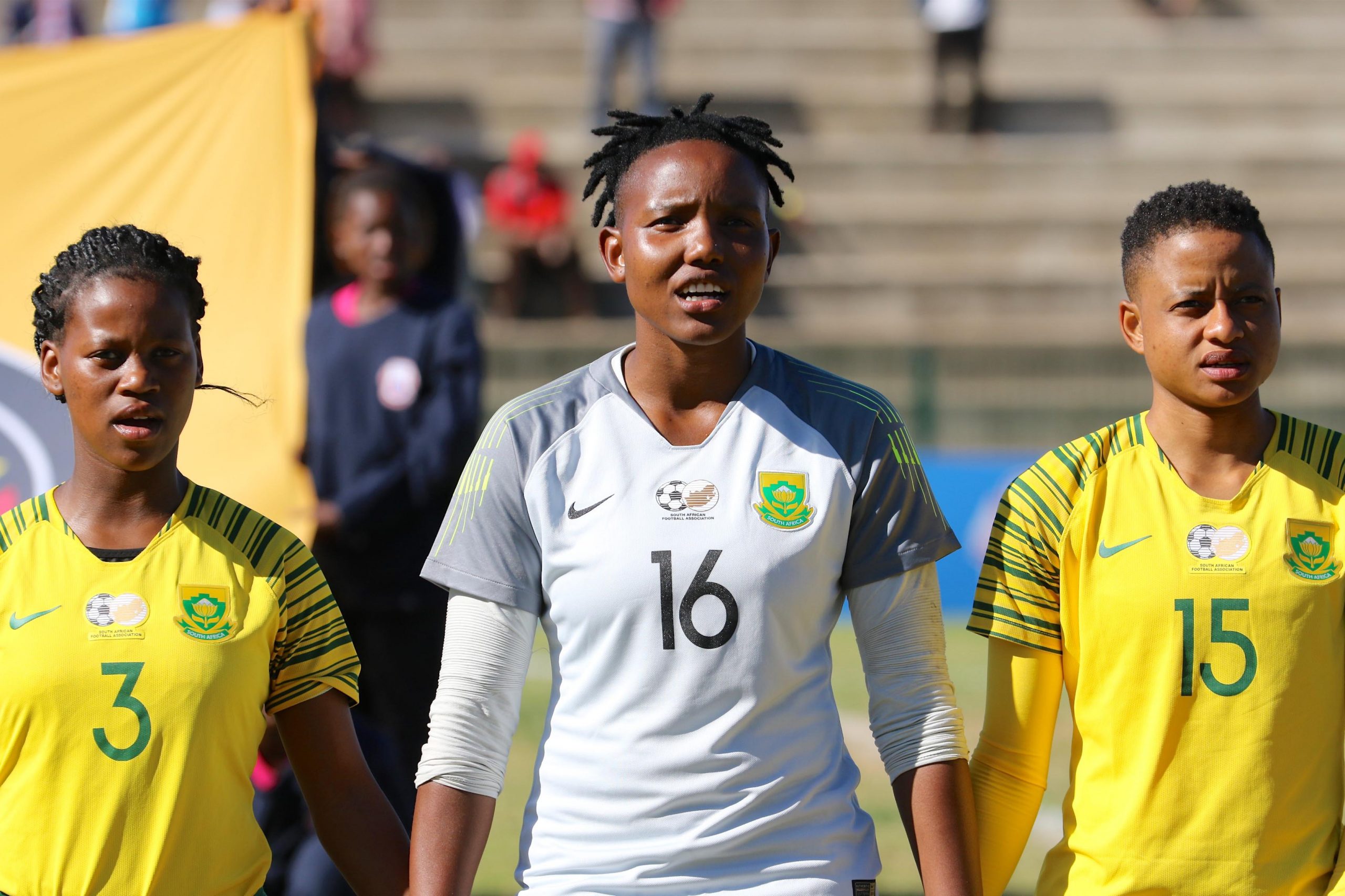Problems mar first season of women’s football league
The long-awaited national women’s league finally kicked off after years of promises, but the teething problems it has endured have dampened the excitement.
Author:
14 March 2020

It must be celebrated that South Africa finally has a structure that sees the best women’s football teams battle with each other on a more regular basis. While the big and well-resourced teams backed by universities and Premier Soccer League (PSL) clubs especially enjoyed a smooth journey in the first-ever season of the Safa Women’s National League (SWNL), this inaugural competition didn’t go without glitches.
In fact, some of the teething problems which the league experienced were the same as those that teams faced in the amateur setup of the Sasol League. This was disappointing as the SWNL, which was launched in August last year, was viewed as a vehicle that would address some of the long-standing problems in women’s football in the country.
The South African Football Association (Safa) struggled to get sponsors for the league, forcing the organisation to carry the financial burden of running it. This came with some serious implications as Safa ran the league in the same office that runs the Sasol, SAB and ABC Motsepe leagues – all manned by one person.
Related article:
This led to a competition that saw Banyana Banyana and other international players having to delay the kickoff of some matches owing to referees not being assigned or not showing up on time. In fact, the Safa office that ran the league is yet to announce Mamelodi Sundowns as the winners of the inaugural SWNL. Sundowns have amassed enough points to win the league and still have games remaining.
Recently, First Touch Ladies and University of Johannesburg (UJ) had to wait for the duration of a game before match officials arrived for their clash. The officials had to finish an SAB League game before heading to the Old Peter Mokaba Stadium where the SNWL game was set to be played. UJ coach Jabulile Baloyi was understandably not impressed.
“We can’t be treated this way. We know we are desperate as women in football to have a premier league [and] then such things are happening. Are the sponsors gonna trust us to manage the sponsorship and to carry the league forward and grow it from what it is now?” the former Banyana assistant coach told the SABC.
‘Hiccups in the league’
That was not the only unfortunate incident that befell Limpopo. Match officials also turned up for First Touch’s game without matching kits, which shows the level of undermining this league routinely endured.
“There were some hiccups in the league, I must admit, particularly with the referees arriving late at the matches,” said Safa acting CEO Gay Mokoena. “But we have tried to sort that out. I know there’s also a recent incident that has happened and I’m still investigating that one.”
Although experiencing a number of problems in the first season, Coal City Wizards’ chairperson, Mabu Moroaswi, believes that teams need to contribute to making the league more successful.
“We are stakeholders [along] with Safa in this league. They are playing their part and we [as teams] should too. We all want to see the league grow and we need to do more as well. We are hoping things will go smoother next year,” said Moroaswi.
“I can’t complain much. Obviously, there were always going to be challenges, [it] being the first season of the league. Travelling was the biggest challenge. The logistics and planning for trips were a challenge. Financially it was straining, but we have learnt and we will do things better next season.”
Related article:
When the SWNL was introduced, Safa stated that the league would be staged in a festival format. However, that only lasted for two rounds. The rest of the season was played on a home and away basis, even though some teams played their home matches outside their provinces. Richmond United, from the Northern Cape, “hosted” Wizards at Sinaba Stadium in Gauteng, for example.
In a meeting with the teams before the start of the league, Safa declared that the winners would walk away with no less than R1 million. This is no longer the case as the winning team will now get only half that. The sum of R1 million will be shared by the teams in the top four positions, with Sundowns getting the bigger slice of the cake.
“It’s a pity that we didn’t record the meeting we had with the association to put on record what the teams were promised. We are just glad that the league started and we went ahead with the hope that people would stick to their word,” said Sundowns coach Jerry Tshabalala. “But we understand that it’s like starting a business – you start small and build on that. But it would have been fair for the association to have kept their word.”
What teams can do
Although teams are not completely happy with the turn of events, they are optimistic that the future will not be as bleak. “If we can stop relying too much on the association, we can make the league better. Look at teams like Coal City. They are going all out to meet the standards of teams like ours that are well supported. That’s what we need: all hands on deck,” Tshabalala said.
Sundowns Ladies showed their dominance by winning all their league matches. However, Tshabalala says it was not all smooth sailing. “When we started the league there was a match that we played without EMS [emergency medical services] and security. It was tough. My players worked hard because they were motivated by the R1 million that was up for grabs. You know that when we win tournaments here at Sundowns, we get to share the prize money. That’s what kept the players working hard. Players were looking forward to sharing the million,” he said.
Related article:
Safa has decided to introduce a 16-team league next season without having serviced the 12 teams properly. JVW FC and Limpopo’s Ma-Indies were originally meant to increase the league to 14 teams, but in new developments Safa has allegedly decided to add two more PSL clubs. These clubs will qualify for the league on the basis of simply having a women’s team. However, Safa is alleged to be selling those two spots for R2.5 million each to a Premier Division team that is keen to have a women’s side.
“There was going to be no relegation and no promotion – all the teams were secured about their position in the league. We feel that might have created an element of people relaxing and teams not being competitive enough. Therefore we are looking to see if we can introduce promotion and relegation as soon as we can,” Mokoena said.
“As you know, we have promoted two teams from the Sasol League and we have 14 teams now. We are looking at an option to either try to fill in the league and have 16 teams now so that we introduce promotion and relegation. The league could create more excitement but we haven’t taken the final recommendation to the NEC [national executive committee] yet. If the NEC approves it, we will probably try to recruit, in one way or another, two more teams. We haven’t approached any [PSL] team. What we will probably do is write to the PSL and discuss it with them.”
Related article:
The SNWL has three university teams competing with teams that have only one competition to worry about. The UJ, University of the Western Cape and Tshwane University of Technology teams are obliged to take part in the University Sport South Africa Championships and the Varsity Football competitions.
It will be a struggle for these teams to participate in all three competitions next season, especially because the season will be much shorter. The first season of the competition wraps up in March, which gives teams just April to rest before registration and preseason begin for the season that will start in June and end in December.
What needs to be fixed
“We have already started recruiting players for the new season. We need to get younger players. We need to start planning for preseason. It’s going to be a demanding season of about 24 or 30 matches. We are going to need a big squad to cope with that, but having bigger squads will also be a challenge in itself,” said Moroaswi.
For the league to grow it will need Safa to increase its efforts and not do things in half measures.
“If you have a women’s team, an MDC [Multichoice Diski Challenge] team and a senior team, male or whatever, you have to go do it right. Otherwise don’t do it,” said Pitso Mosimane, head coach of Sundowns’ senior men’s team. “Imagine having Mamelodi Sundowns Ladies team and we were not doing it right. We have no excuse not to do it right.”
The Brazilians are becoming one of the most progressive teams in terms of women’s football in South Africa. In the past, the players would get a stipend of as little as R500 a month, but they have become the first club to offer their women players professional contracts.
There is an increasing number of South African footballers playing abroad, and that’s largely due to the Fifa Women’s World Cup that was beamed across the globe. That exposure was priceless, which is why it is important for Safa to secure a television broadcast deal for the new season.




